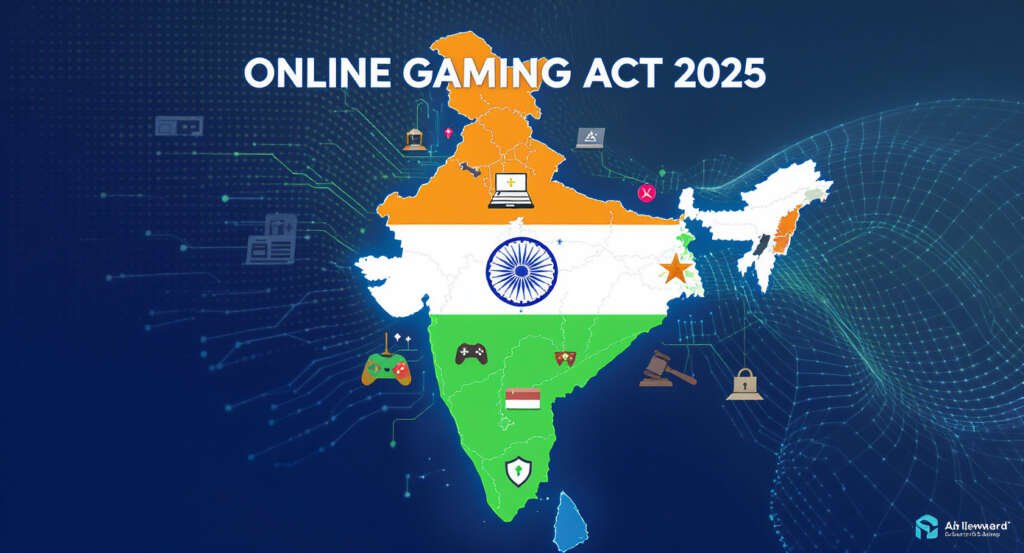A digital revolution in India brought energy and force in the form of online gaming. A huge number of gamers in India are using video games for entertainment, social experience and work. The online gaming market is rapidly evolving to meet these needs, having existed for some time in an ambiguous grey area of regulation, creating uncertainty for consumers and operators.
The Promotion and Regulation of Online Gaming Act 2025 marks a turning point for India’s online gaming policy landscape. As the first real comprehensive federal legislation focused on online gaming, it emerges against the backdrop of evolving state-by-state regulations, replacing a confusing patchwork of growing state laws and state court opinions. It serves as a baseline framework for all of India. Not only is this a momentous accomplishment, but it also represents stronger and clearer protections for gamers, clearer pathways for operator investment and innovation. The new regulatory and supervisory tools will help develop a safe growth environment, while regulating social harms and then using evidence to innovate against that. This legislation is not just a set of rules; it is the groundwork upon which the future of India’s online gaming ecosystem will be built.
The Evolution of Online Gaming Regulation in India
To acknowledge the significance of the epoch-making regulatory act of 2025, one should appreciate the inconsistent and often contradictory legal tapestry of progress that was in place prior to its introduction.
History of Change in Indian Gaming Regulation
India’s journey to the Online Gaming Act 2025 has not happened in a day. The trajectory of gaming law in India showcases a gradual transition from colonial-era prohibitions towards a contemporary regulatory context that recognizes the importance of online technologies.
Prior to 2000, The Colonial Legacy
The entire legal landscape was governed by the archaic Public Gambling Act of 1867, a law conceived long before the internet existed.
Its scope was narrow, focusing almost entirely on prohibiting physical “gambling houses.” As a result, it left a massive legal vacuum around digital games, offering no definitions for online activity and no guidance on their legality.
2000s, The IT Act Era
The historic Information Technology Act, 2000, laid the foundation for digital commerce and cybersecurity in India. However, it was silent on the many complexities of online gaming. The incredible rise of the internet left the industry in a legislative gray zone, with operators and players alike clueless as to what was gaming under the laws of India. With legislation absent, the courts stepped in to determine the future of Indian gaming laws. The courts grappled with the important distinction between games of skill and games of chance
Key precedents included:
- In State of Andhra Pradesh v. K. Satyanarayana (1968), the court ruled that Rummy was a game of skill
- In Dr.K.R. Lakshmanan v. State of Tamil Nadu (1996), the court affirmed the legal footing for treating skill-based games as legitimate.
These two cases became the initial legal defences for early skill-based platforms, allowing them to continue operating despite the absence of specific legislative support.
2010s, The Fantasy Sports Explosion
The complete growth and explosive popularity of fantasy sports, revolving around platforms like Dream11, gave rise to new legal debates.
The watershed moment came in a decision delivered by the Punjab and Haryana High Court on the legality of the daily fantasy sports market. In 2017, for the first time, the court ruled that fantasy sports were games of skill. This decision provided the industry with significant authoritative endorsement and helped catalyse investment, innovation, and subsequent growth and development of Indian gaming startups.
Early 2020s, The Government Reacts
The rise and expansion finally reached that point (again!) by the early 2020s, where online gaming could no longer be ignored. The public recognition of the economic potential of the market and the risks of the absence of any regulatory clarity meant the Indian government could no longer resist holding inter-ministerial talks on the regulation of online gaming.
An important administrative decision followed for the first time, the Ministry of Electronics and Information Technology (MeitY) was formally designated as the nodal department for any regulation relating to online gaming/ online skill games. Also, for the first time, online gaming was explicitly separated from the definitions of gambling and betting, signalling federal approbation for the introduction of a regulatory framework.
The Promotion and Regulation of Online Gaming Bill, 2025 is not about stopping gaming—it’s about encouraging the right kind. Play, learn, compete—without the risks of money gaming.@MIB_India #DigitalIndia #OnlineGamingBill2025 pic.twitter.com/qHNeJDoPoM
— Ministry of Electronics & IT (@GoI_MeitY) August 20, 2025
The turning point arrived in 2023, when MeitY enacted the Information Technology (Intermediary Guidelines and Digital Media Ethics Code) Amendment Rules, 2023.
This was the first dedicated framework for the sector, bringing real regulatory clarity. The rules,
- Established self-regulatory bodies to certify permissible games.
- Imposition of due diligence obligations on gaming intermediaries.
- Signaled a monumental shift from ambiguity to a foundation for structured regulation.
Major Roadblocks in the Pre-2025 Act
These gradual developments in the online gaming ecosystem have presented their own set of issues.
Jurisdictional Mess
Online gaming can cross borders, but gambling is a state subject as laid out in the Indian Constitution. This has created a confusing jurisdictional mess that muddled state and central authority, creating conflict.
Consumer concerns
Players had no recourse against fraudulent operators, unfair practices, and addiction, with no nationally applicable grievance redressal mechanism.
Business Concerns
The lack of a clear licensing regime and tax structure caused hesitation to undertake serious investment, while being unable to manage and onboard credible startups.
Money Laundering and Fraud
The unregulated environment posed a significant risk for illicit use, thus undermining consumer and public credibility.
The 2025 Act is a direct response and much-needed solution to these decades of challenges.
Key Features of the Online Gaming Act, 2025
Let’s break down the Act’s core elements. While the full document is dense with legal language, its essence boils down to a few foundational pillars designed to bring order to the digital playground.
1. What Actually is an “Online Real Money Game”?
For years, this was the million-dollar question with no clear answer. The 2025 Act cuts through the noise by providing a concrete, legal definition. It classifies an “online game” as any game offered on the internet where a user deposits money or something of value with the hope of winning a prize.
But here’s the crucial part. The act introduces a concept of “permissible online real money games.” This isn’t a free-for-all, and only games officially certified as games of skill, or those explicitly not falling under gambling, get this green light. This single definition is the bedrock of the entire law—it’s the rulebook that everyone, from developers to players, now has to play by.
2. Licensing & Compliance
Gone are the days when anyone could set up a gaming platform with minimal oversight. The Act establishes a mandatory licensing system, fundamentally changing how operators do business in India.
a. Must be Indian
To get a license, the operating entity must be a company incorporated in India. This ensures they fall squarely under Indian jurisdiction.
b. The Fit-and-Proper Test
It’s not just about the company; it’s about the people running it. Directors and key executives will undergo rigorous background checks to ensure they are fit to hold a license.
c. Clarity for Foreign Investment
The Act finally clears the fog around Foreign Direct Investment (FDI), expected to allow it through automatic routes for licensed companies. This is a huge deal, as it opens the doors for serious global capital to flow into the Indian gaming ecosystem.
d. A Level Playing Field for International Giants
Big international operators can no longer simply target Indian users from offshore. If they want a piece of the Indian market, they must set up shop locally, incorporate an Indian entity, and obtain a license just like everyone else. This ensures they pay taxes here and are accountable to Indian laws.
3. Taxation
This was perhaps the most contentious issue before the Act. The law brings a sigh of relief by drawing a clear, unmistakable line in the sand regarding taxes.
a. Taxing the Commission, not the Pool
The platform’s revenue, which is the fee it charges for hosting the game, will be subject to standard corporate tax and GST. This ends the long-standing and chaotic debate over whether the government should tax the entire contest entry amount (the prize pool).
b. Player Winnings
For players, nothing changes from the income tax perspective. Winnings above ₹10,000 remain subject to Tax Deducted at Source (TDS) as per existing laws. The clarity is for the operators, not the players’ tax liability.
4. Who’s Watching the Watchmen?
You can’t have a new set of rules without a referee to enforce them. The Act proposes the creation of an independent Online Gaming Authority, as the central command for the industry, tasked to do the following:
- Playing gatekeeper by issuing, suspending, and revoking licenses.
- Serving as the certifying authority for deciding whether a game qualifies as a “money game”
- Supervising operators to comply with every rule.
- Acting as a protector of player interests, monitoring the levels of fair play, and ensuring transparency.
- Advising the government on future policy changes, considering the pace of change in this area.
What are the ramifications for gambling generally and for games of skill?
The Act did not shy away from the important debate. It is a definition based on legislation, reinforcing the distinction between skills and chance. Game of chance refers to activities where luck is a significant factor, such as online roulette or online slots, which are by definition gambling. The Act does not legalize these activities across the country, but simply establishes a framework recognizing these activities as gambling on a federal level, with each state able to decide whether they want to prohibit them in their jurisdiction or not.
The framework also recognises that the technology platform, intermediary network, and finally, the gambling opportunities take place in a separate layer from the actual gambling activity itself.
Skill-based games that result in winners based largely on the player’s skill, knowledge and repeated practice; for example, fantasy sports, rummy, and e-sports, are recognized as legitimate activities. Operators in these sectors can breathe easy as they can obtain a license and operate legally across the country, provided they strictly adhere to the new regulations on consumer protection and fairness.
The Direct Impact?
Online casinos, being purely chance-based, will find it nearly impossible to operate openly in India. For platforms that host games, like poker, that sit in a grey area, the plight is a little bit more complicated. They will almost certainly go on as “skill games,” but there will be a new phase of sustained scrutiny, with much stricter rules concerning advertising, the application of proven fair-play algorithms, and player safety.
Impact on Indian Gaming Startups and International Operators
For Indian Gaming Startups
The Act is a double-edged sword but ultimately a net positive. The compliance costs and regulatory overhead could present substantial obstacles for smaller startups. However, the rewards are tremendous, including legitimacy of operations, access to formal banking services, definitional clarity on tax obligations, and an orderly framework that provides potential investors with a sense of comfort. Startups can now focus on innovation and expansions instead of worrying about legal recourse.
For International Operators
The Act ends the era of foreign operators accessing the Indian market without a physical presence. They must now “Make in India” by establishing a local entity, hiring locally, and complying with Indian laws.
While this introduces a barrier to entry, it also establishes a clear and legitimate blueprint for accessing one of the largest gaming markets in the world. It ensures that revenue and taxes are retained in the Indian economy.
Challenges and Criticisms of the Online Gaming Act, 2025
No legislation is ideal, and the 2025 Act will undoubtedly face some critiques:
Implementation Challenges
The success of the Act depends on the functioning of the new Online Gaming Authority. Developing the authority’s capacity and ensuring its effectiveness may be challenging. A few other challenges that may present themselves at the time of the Act’s implementation includes
The Skill vs Chance Argument: While the Act establishes a framework, the precise nature of certain hybrid games (e.g., certain poker games, new game formats) could still be subject to legal contestation. “Predominance of skill” must be extremely precise.
Advertising and Promotion: Critics contend that the Act does not do enough to stop aggressive and potentially misleading advertising by gaming platforms. Many platforms target vulnerable demographics.
Resistance from the States: Given that gambling is a matter reserved for states, certain states may challenge the federal government through the courts as to whether it has jurisdiction to make rules with a national articulation.
The Future
The Online Gaming Act, 2025, is not a conclusion but a beginning, which is likely to evolve in the following ways:
Technological Amendments: Ongoing technological amendments will be required to keep pace with new technologies, such as games based on blockchain, NFT, and the metaverse, to name a few variations/contextual possibilities, with new regulatory challenges.
E-sports Integration: The boundaries between casual real-money gaming and competitive e-sports might become increasingly blurry; for instance, the new Act will need to expand to support e-sports competitions and identify a specific place for burgeoning e-sports athletes and leagues in India.
Data Privacy: The existing and emerging collections of user data from gaming platforms are likely to place the new Act in close interaction with India’s Digital Personal Data Protection Act (2023) — hence, data governance norms will need to be more specific and stricter.
Global Convergence: As the regulation of online gaming grows rapidly in China, the USA, the UK and other major economies, India is likely to establish standards that are in line with the best practice standards set by regulators in other jurisdictions to facilitate cross-border operations and investments
The future landscape will most likely be characterized by consolidation, innovation and professionalism. As the online gaming industry matures into a sustainable pillar of the digital economy, the Promotion and Regulation of Online Gaming Act, 2025, marks India’s definitive move into the next generation of digital entertainment.
The Act is ambitious and desperately needed. It provides clarity where there was none and accountability in exchange for risk. By offering a regulated space in which skill-based gaming can be accepted as a legitimate pastime with consumer protections in place, and incentivising legitimate enterprise, the Act could help unlock the necessarily big potential of India’s online gaming industry.
This is the acceptance of online gaming as a legitimate and here-to-stay activity. Instead of ignoring or ineffectively trying to ban it, this is an attempt to accept and regulate it sensibly. Many challenges are yet to arise from the Act’s implementation, but it provides the entrance point to a journey to holistic and effective regulation that will make India a leader in responsible and innovative online gaming development.
FAQs
1. What is this new Act?
India’s first nationwide law to regulate online gaming, the Act establishes a licensing system for gaming apps and platforms. It formally distinguishes between games of skill and games of chance while introducing strong player protection and safety rules.
2. Does it legalize online gambling?
No. The Act explicitly classifies games of chance—such as online casinos—as gambling. It allows states to ban them within their borders and makes it harder for illegal offshore gambling platforms to target Indian users.
3. What happens to games like fantasy sports?
Fantasy sports are recognized as legal, skill-based games. Their operators can now obtain licenses and operate nationwide, provided they strictly comply with the Act’s consumer protection and fairness requirements.
4. How does it help Indian gaming startups?
For startups, the Act brings much-needed clarity and legitimacy. Key benefits include:
- A defined path to licensing.
- Certainty on taxation, with GST applied only to platform fees (not the prize pool).
- A level playing field against large international operators.
5. Will players pay more tax on winnings?
No. The tax rules for players remain unchanged. Winnings over ₹10,000 continue to be subject to TDS (Tax Deducted at Source) under the existing income tax law. The Act clarifies the tax obligations for gaming companies, not players.




